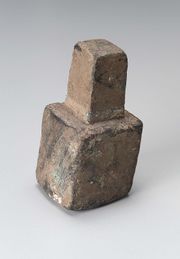Difference between revisions of "Lead oxide"
Jump to navigation
Jump to search
| (3 intermediate revisions by the same user not shown) | |||
| Line 1: | Line 1: | ||
| + | [[File:Greek dowel-SC38562.jpg|thumb|Bronze dowel coated with lead oxide; MFA# Res.84.50]] | ||
== Description == | == Description == | ||
| Line 14: | Line 15: | ||
* Skin contact may cause irritation or ulcers. | * Skin contact may cause irritation or ulcers. | ||
* Carcinogen, teratogen, suspected mutagen. | * Carcinogen, teratogen, suspected mutagen. | ||
| − | + | * ThermoFisher: [https://www.fishersci.com/msds?productName=AC221110050&productD.. SDS] | |
| − | ThermoFisher: [https://www.fishersci.com/msds?productName=AC221110050&productD.. SDS] | ||
[[Category:Materials database]] | [[Category:Materials database]] | ||
Latest revision as of 10:21, 6 October 2022
Description
Lead oxide is found in the red tetroxide (Red lead), the yellow monoxide (Litharge, Massicot) form, the brown dioxide form and the black suboxide form. These toxic pigments may be dissolved in acids and are sensitive to sulfur gases. See Lead dioxide, Lead monoxide, and Lead tetroxide.
Synonyms and Related Terms
oxyde de plomb (Fr.); xido de chumbo (Port.)
Examples include: lead monoxide (litharge, massicot); lead dioxide (brown); lead tetroxide (red lead, minium); lead suboxide (black)
Risks
- Toxic by inhalation or ingestion
- Skin contact may cause irritation or ulcers.
- Carcinogen, teratogen, suspected mutagen.
- ThermoFisher: SDS
